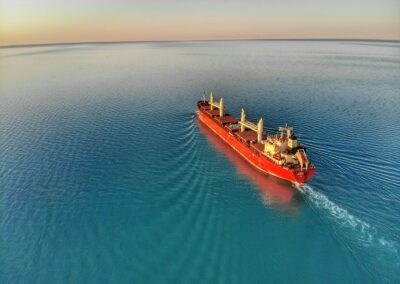Understanding the Vital Role of Shipping in Modern Economics
The Misconceptions of Modern Transport
Dive into our exploration of “Global Supply Chain Insights,” revealing the critical yet often overlooked role of maritime transport in sustaining worldwide trade. Understand how this sector, fundamental to our economy, navigates challenges and innovations that shape our daily lives and global markets.
While many envision modern transport as predominantly airborne, characterized by instant gratification akin to digital data transmission, the reality is strikingly different. The vast majority of global trade still relies heavily on maritime transport, an industry that operates under the radar of everyday perception yet is crucial to our economic fabric. This slow-moving yet extensive network of cargo ships, far from the speed of air travel, delivers the bulk of our goods. As noted by British journalist Rose George, our societal perception often overlooks these “hefty ships that travel more slowly than senior citizens drive,” underestimating their critical role in sustaining global markets.
The Backbone of Global Trade: Maritime Transport
Maritime transport is not just a component of global trade; it is its backbone. More than 80% of world goods trade by volume is carried by sea, according to the United Nations Conference on Trade and Development. The sheer scale of this operation is often underappreciated, with thousands of vessels navigating across our oceans to ensure the steady flow of everything from raw materials to finished products. The strategic importance of key shipping lanes underscores the sector’s significance, highlighting how geopolitical stability in these areas directly influences global market dynamics and supply chain resilience.
Challenges Facing the Maritime Industry
The maritime shipping industry faces numerous challenges, from environmental concerns to piracy and geopolitical tensions. The slow pace of shipping, while reliable, also presents issues of efficiency and speed, particularly when compared to air transport. However, this sector is also at the forefront of significant innovation, with advancements in cleaner fuel technologies and automation. Navigating these challenges requires a nuanced understanding of both the economic imperatives and the environmental stakes involved, pointing to a complex but essential industry at the heart of global commerce.
Technological Innovations Reshaping Maritime Transport
Technological advancements are setting the stage for transformative changes within the maritime industry. Innovations such as autonomous ships and blockchain for logistics management are on the rise, poised to enhance operational efficiencies and redefine the traditional parameters of shipping. These technologies promise to improve route planning, reduce human error, and streamline customs procedures, potentially leading to faster and more cost-effective transport solutions. This evolution is crucial for maintaining the competitiveness of maritime transport in an era where speed and efficiency are increasingly valued.
Economic Impact and the Future of Maritime Shipping
The economic impact of maritime shipping is profound, influencing everything from local markets to international economic policies. The dependency on maritime transport for bulk goods ensures its continued relevance, but also requires adaptive strategies to cope with an ever-changing global economic landscape. Looking forward, the industry must address sustainability issues, with a push towards decarbonization and improved environmental performance. The journey of maritime transport, much like the vessels themselves, may be slow, but its direction is forward, navigating through contemporary challenges towards a more efficient and sustainable future.
Conclusion: Reassessing Our View of Global Trade and Transport
It’s essential to reassess our understanding of global trade mechanisms, recognizing the pivotal role played by maritime transport. The insights offered by commentators like Rose George invite us to look beyond the surface of consumerism to the underlying structures that support our way of life. By doing so, we gain a deeper appreciation for the complexities and the sheer scale of maritime transport as an indispensable element of global trade. Acknowledging this reality allows for more informed discussions on trade, economics, and the future of global transport logistics.
#GlobalSupplyChain, #MaritimeTransport, #CargoShipping, #InternationalTrade, #Logistics, #EconomicImpact























